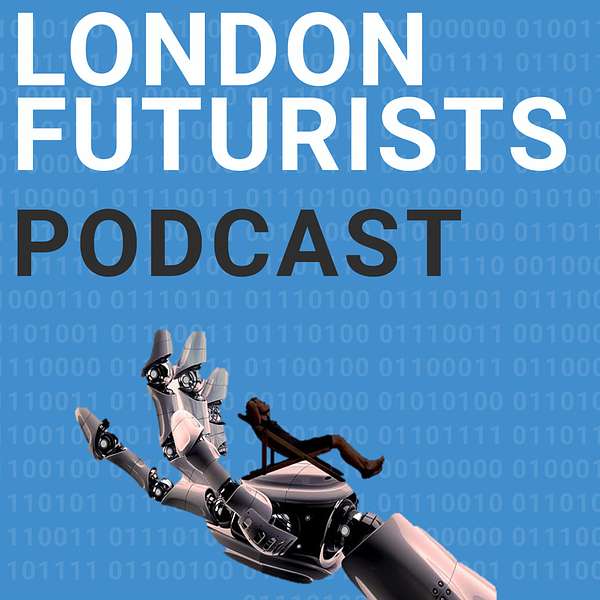
London Futurists
Anticipating and managing exponential impact - hosts David Wood and Calum Chace
Calum Chace is a sought-after keynote speaker and best-selling writer on artificial intelligence. He focuses on the medium- and long-term impact of AI on all of us, our societies and our economies. He advises companies and governments on AI policy.
His non-fiction books on AI are Surviving AI, about superintelligence, and The Economic Singularity, about the future of jobs. Both are now in their third editions.
He also wrote Pandora's Brain and Pandora’s Oracle, a pair of techno-thrillers about the first superintelligence. He is a regular contributor to magazines, newspapers, and radio.
In the last decade, Calum has given over 150 talks in 20 countries on six continents. Videos of his talks, and lots of other materials are available at https://calumchace.com/.
He is co-founder of a think tank focused on the future of jobs, called the Economic Singularity Foundation. The Foundation has published Stories from 2045, a collection of short stories written by its members.
Before becoming a full-time writer and speaker, Calum had a 30-year career in journalism and in business, as a marketer, a strategy consultant and a CEO. He studied philosophy, politics, and economics at Oxford University, which confirmed his suspicion that science fiction is actually philosophy in fancy dress.
David Wood is Chair of London Futurists, and is the author or lead editor of twelve books about the future, including The Singularity Principles, Vital Foresight, The Abolition of Aging, Smartphones and Beyond, and Sustainable Superabundance.
He is also principal of the independent futurist consultancy and publisher Delta Wisdom, executive director of the Longevity Escape Velocity (LEV) Foundation, Foresight Advisor at SingularityNET, and a board director at the IEET (Institute for Ethics and Emerging Technologies). He regularly gives keynote talks around the world on how to prepare for radical disruption. See https://deltawisdom.com/.
As a pioneer of the mobile computing and smartphone industry, he co-founded Symbian in 1998. By 2012, software written by his teams had been included as the operating system on 500 million smartphones.
From 2010 to 2013, he was Technology Planning Lead (CTO) of Accenture Mobility, where he also co-led Accenture’s Mobility Health business initiative.
Has an MA in Mathematics from Cambridge, where he also undertook doctoral research in the Philosophy of Science, and a DSc from the University of Westminster.
London Futurists
The Economic Singularity, Bletchley Park, and the Future of AI
The UK government has announced plans for a global AI Safety Summit, to be held in Bletchley Park in Buckinghamshire, outside London, on 1st and 2nd of November. That raises the importance of thinking more seriously about potential scenarios for the future of AI. In this episode, co-hosts Calum and David review Calum's concept of the Economic Singularity - a topic that deserves to be addressed at the Bletchley Park Summit.
Selected follow-ups:
https://www.gov.uk/government/news/uk-government-sets-out-ai-safety-summit-ambitions
https://calumchace.com/the-economic-singularity/
https://transpolitica.org/projects/surveys/anticipating-ai-30/
Topics addressed in this episode include:
*) The five themes announced for the AI Safety Summit
*) Three different phases in the future of AI, and the need for greater clarity about which risks and opportunities apply in each phase
*) Two misconceptions about the future of joblessness
*) Learning from how technology pushed horses out of employment
*) What the word 'singularity' means in the term "Economic Singularity"
*) Sources of meaning, beyond jobs and careers
*) Contrasting UBI and UGI (Universal Basic Income and Universal Generous Income)
*) Two different approaches to making UGI affordable
*) Three forces that are driving prices downward
*) Envisioning a possible dual economy
*) Anticipating "the great churn" - the accelerated rate of change of jobs
*) The biggest risk arising from technological unemployment
*) Flaws in the concept of GDP (Gross Domestic Product)
*) A contest between different narratives
*) Signs of good reactions by politicians
*) Recalling Christmas 1914
*) Suspension of "normal politics"
*) Have invitations been lost in the post?
*) 16 questions about what AI might be like in 2030
Music: Spike Protein, by Koi Discovery, available under CC0 1.0 Public Domain Declaration
Elevate how you lead with insight from today’s most influential executives.
Listen on: Apple Podcasts Spotify

